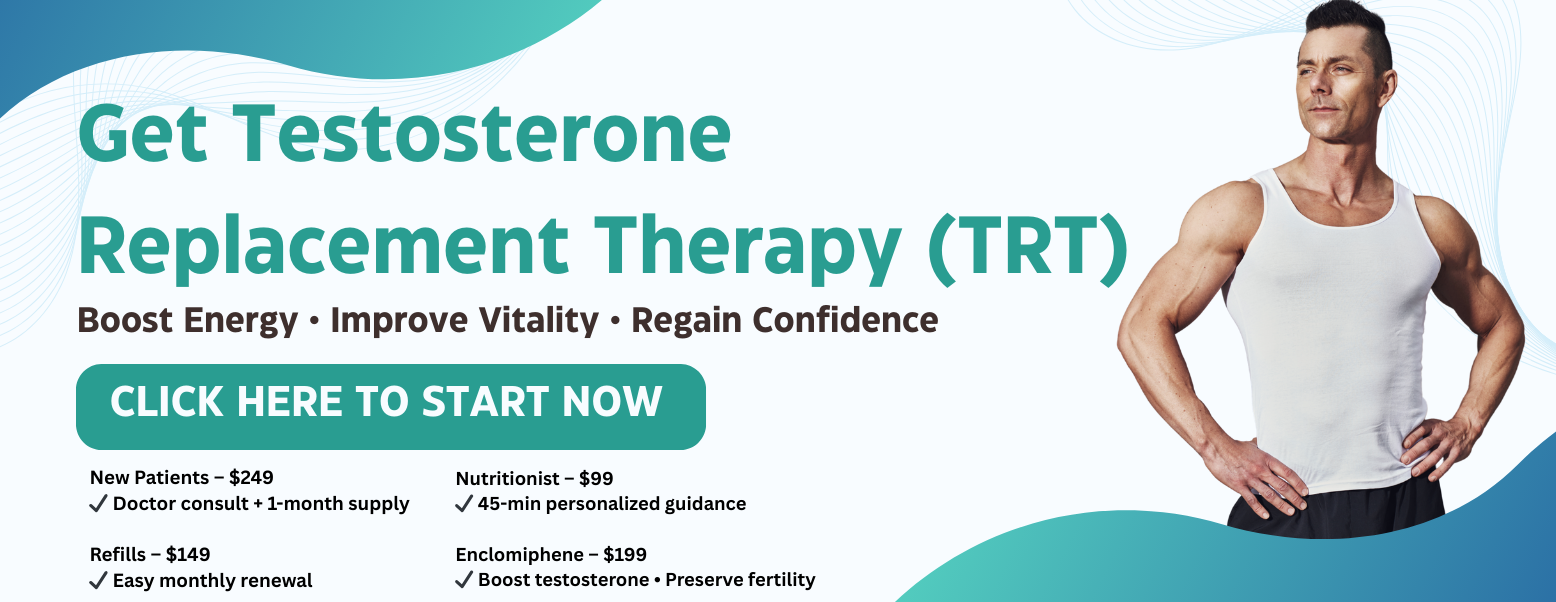Lifestyle factors and unhealthy habits contribute to hormonal imbalances in men. Hormonal imbalance, while many people ignore it, can disturb your daily activities and cause unnecessary hindrances in your routine activities, such as fatigue, irritability, anxiety and even low libido. This is why many people are now looking towards hormone therapies such as TRT.
TRT enhances various aspects of the body, such as sex drive, vitality, strength, and mood, which make men feel better. However, there is still a widespread concern and fear: Does TRT cause prostate cancer?
Don’t Wait, Reclaim Your Vitality – Click here to Book Your TRT Consultation Now!
Higher testosterone levels were thought to raise the risk of prostate cancer for many years. However, a new study from 2025 suggests this might not be true.
In this article, we will discuss the most recent research on TRT and prostate cancer. This information can help you better understand the dangers and advantages of TRT, whether you are considering starting it or are already using it.
About Prostate Cancer and Its Risk Factors
The second most prevalent cancer in men is prostate cancer. Usually, men over 50 are affected. While some grow more quickly, others are more aggressive.
The following factors raise the chance of developing prostate cancer:
- Age: Your risk increases as you age.
- Family History: Your chances increase if someone in your family had it.
- Race: It is more common among African-American men.
- Hormones: Prostate health may be impacted by variations in DHT or testosterone.
- Lifestyle: Smoking, eating poorly, and not exercising raise risk.
- Inflammation: Prostate swelling over time might result in cancer.
Does Low Testosterone Increase Prostate Cancer Risk?
In the past, people thought that too much testosterone caused prostate cancer. But now, some research shows that low testosterone might also be linked to more dangerous forms of prostate cancer.
1. Low Testosterone and High Gleason Scores
The Gleason score tells how aggressive the cancer is. Men with low testosterone levels often have higher Gleason scores, which means their cancer is more serious. This shows that very low testosterone might allow cancer to grow more aggressively.
2. Hormonal Imbalance Impacts DNA Repair
Testosterone helps repair damaged cells in the body. When levels are low, your body may not fix damaged DNA properly. This can lead to cancer cells forming, especially in the prostate.
3. Association with Chronic Inflammation
Low testosterone is connected with inflammation in the prostate. Inflammation means the area is irritated or swollen for a long time, which may lead to cancer if not treated.
4. Testosterone as a Prostate Regulator
Testosterone helps control how prostate cells grow and work. Without enough testosterone, this control is lost. This may lead to abnormal cell growth and possibly cancer.
5. Low Testosterone Linked to Poorer Prognosis
Studies show that men with both prostate cancer and low testosterone often have worse outcomes. Their cancer is more likely to return after treatment. Healthy testosterone levels may help improve treatment results.
Does TRT Accelerate Existing Prostate Cancer?
Some people are afraid that TRT might make existing prostate cancer grow faster. In the past, men with prostate cancer were told not to take TRT. But new research shows that TRT can be safe for many men who had prostate cancer in the past and are now cancer-free.
1. The Role of PSA Monitoring in Existing Cancer
Doctors check PSA levels (a prostate health marker) to see if TRT is affecting the prostate. If PSA rises quickly, it might be a warning sign. But with the right dose, TRT usually doesn’t cause problems.
2. Risk Differs by Cancer Type and Stage
Some prostate cancers are slow-growing and don’t react much to testosterone. Others are more aggressive. Doctors look at the cancer type and stage before deciding if TRT is safe.
3. Emerging Evidence from Post-Treatment Patients
Recent studies show that men who had prostate cancer treatment and are now healthy can often take TRT without problems. This is different from what doctors believed years ago.
4. The Importance of Dosing and Delivery methods
The way TRT is given matters. Gels, injections, and pellets all work differently. Doctors often start with low doses and increase slowly to avoid hormone spikes that could affect the prostate.
5. Not Recommended for Active, Untreated Cases
Men who still have untreated or advanced prostate cancer should not take TRT. In such cases, doctors use hormone blockers instead to stop cancer growth.
How to Protect Your Prostate While on TRT
TRT can be safe, but it’s still important to take care of your prostate. Here are a few simple tips to protect it:
1. Monitor DHT and Estrogen Levels
Testosterone can change into DHT and estrogen. Too much of these hormones can cause prostate problems. Regular blood tests help keep these hormones in the right range.
2. Maintain an Anti-Inflammatory Diet
Eat healthy foods like tomatoes, green tea, broccoli, and turmeric. These reduce inflammation and protect your prostate. Avoid processed foods, sugar, and too much red meat.
3. Avoid Over-Supplementation
Don’t take extra testosterone boosters without asking your doctor. Too many supplements can throw your hormones off balance and harm your prostate.
4. Include Routine Digital Rectal Exams (DREs)
A DRE is a quick test where the doctor checks your prostate by feeling it through the rectum. It’s not painful and helps catch early signs of problems.
5. Maintain a Healthy Weight and Lifestyle
Being overweight increases the risk of prostate cancer. Regular exercise and staying active help balance hormones and reduce inflammation.
How does The KIF Prioritize Prostate Safety?
At The KIF, your safety comes first. Our TRT treatment focuses on keeping the prostate healthy while improving your testosterone levels.
1. Pre-Treatment Screening and Baseline Assessment
Before starting TRT, The KIF checks your health with blood tests, scans, and physical exams. They make sure it’s safe for you to begin treatment.
2. Custom Dosing to Prevent Hormonal Fluctuations
Everyone gets a custom TRT plan. Doses are adjusted based on your body and test results to keep hormone levels steady and safe.
3. In-House Urologist Collaboration
The KIF works with urologists, who are prostate specialists. If anything unusual is found, you’ll be checked by a specialist right away.
4. Monthly Monitoring and Transparent Communication
Each month, our team of experts checks your bloodwork and tracks your progress. They explain all results clearly, so you understand how you’re doing.
Conclusion
Many people once believed that testosterone caused prostate cancer. But new research in 2025 shows that’s not true. In fact, low testosterone may be linked to more serious cancer risks.
TRT can be safe and helpful when done correctly, with regular monitoring and the right lifestyle changes. Clinics like The KIF make sure your treatment supports your overall health and keeps your prostate safe.
If you want to feel better with TRT and stay safe, you can book a free consultation with us. By choosing us for your TRT solution, you can enjoy the following benefits and make the most of your hormonal health:
- Personalized monthly TRT plans
- Complete lab tests, including PSA
- Access to expert doctors and urologists
Start your TRT journey safely with the support you need book your free consultation with us today.
 Since 2021, Kif offers a streamlined platform to get a medical marijuana card online. We have served more than 45K patients across the United States. Sign Up Now to get the right to use medical cannabis for your health condition without any delay.
Since 2021, Kif offers a streamlined platform to get a medical marijuana card online. We have served more than 45K patients across the United States. Sign Up Now to get the right to use medical cannabis for your health condition without any delay.
























